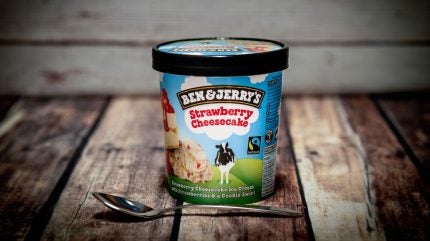
The founders of Ben & Jerry’s have called on parent company Unilever to allow the ice-cream brand to operate as an “independently owned company”.
Ben Cohen and Jerry Greenfield, who set up Vermont-headquartered Ben & Jerry’s in 1978 before Unilever’s acquisition in 2000, have penned a letter to Unilever ahead of the targeted separation of ice cream in mid-November.

Discover B2B Marketing That Performs
Combine business intelligence and editorial excellence to reach engaged professionals across 36 leading media platforms.
The planned spin-off was first announced early in 2024 and the entity then proclaimed as The Magnum Ice Cream Company (TMICC), which will be listed on exchanges in London, Amsterdam and New York post the separation in November.
As well as Ben & Jerry’s, the new set up includes other global ice-cream brands such as Solero, Cornetto, Twister and Carte D’Or.
Cohen and Greenfield said they now feel “compelled to speak out”, suggesting Unilever has not honoured the 2000 takeover agreement, which purportedly “guaranteed the company’s [Ben & Jerry’s] autonomy…with the freedom to pursue its social mission”.
The founders added in the letter: “We are deeply concerned that the commitments made to us, our employees and our customers are being eroded.

US Tariffs are shifting - will you react or anticipate?
Don’t let policy changes catch you off guard. Stay proactive with real-time data and expert analysis.
By GlobalData“For several years now, the voice of Ben & Jerry’s has been silenced by Unilever, particularly when the brand has tried to speak out about social justice and unjust wars. That is not the Ben & Jerry’s that we founded, or the one that we envisioned when we agreed to join Unilever 25 years ago.”
Cohen and Greenfield have a history of agitating with Unilever under their social mission agenda since the 2000 acquisition.
Earlier this year, Ben & Jerry’s filed a case in a New York court accusing the FMCG giant of ousting its then-CEO Dave Stever in what was deemed as Unilever’s attempt to silence the mission agenda.
In another court filing in 2024, Ben & Jerry’s said Unilever had tried to ban it from publicly criticising President Donald Trump. The ice-cream maker also filed a lawsuit that same year claiming Unilever had tried to stop it from expressing support for Palestinian refugees.
Unilever had sold its ice-cream operation in the Israeli-occupied West Bank in 2022 in an attempt to draw a line under a diplomatic row stemming from Ben & Jerry’s halting sales in the territory the previous year. In retaliation, Israel had threatened a boycott of the company’s products.
In their latest salvo, the founders said: “We no longer believe that Ben & Jerry’s belongs under the umbrella of a corporate entity that fails to support its founding mission…Magnum may be a new company, but it retains the legacy, leadership and investment of Unilever’s ice-cream business and the history of its actions against Ben & Jerry’s.”
They then pressed Unilever to “allow Ben & Jerry’s to operate once again as an independently owned company, supported by socially aligned investors and free to honour its mission without compromise”.
Approached for comment on the letter by Just Food today (10 September), a spokesperson for TMICC said: “Ben & Jerry’s is a proud part of The Magnum Ice Cream Company and is not for sale.
“We remain committed to Ben & Jerry’s unique three-part mission – product, economic and social – and look forward to building on its success as an iconic, much-loved business.”
Unilever held a capital markets day yesterday (9 September) to present its TMICC agenda post the November split. It is headed up by CEO Peter ter Kulve and CFO Abhijit Bhattacharya.
The consumer goods giant reaffirmed it will retain a 20% interest in the business, a stake that will gradually be wound down “over time”. Unilever expects to incur €800m ($936.4m) in separation costs, mainly from technology, of which 80% will be realised by the end of 2026, according to a presentation.
Restructuring costs will amount to around 0.8% of group revenues from 2025-2028.
Supplying both the retail and foodservice channels, TMICC will command a 21 global market share ahead of Froneri’s 11%, in what was described as “two global pure-play ice-cream players”.
Froneri is a joint venture between Nestlé and PAI Partners, the private-equity firm that is purportedly weighing up a sale or spin-off of its stake.
The separated Unilever business is targeting annual organic growth of 3-5% over the “medium term” from 2026.
Ice cream generated sales revenue for Unilever of €7.9bn in 2024 and an adjusted EBITDA print of €1.3bn.




